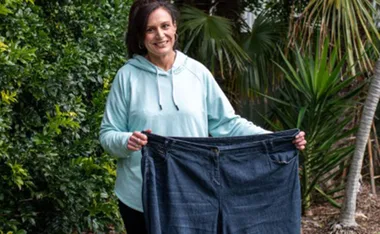Irrespective of whether you are a recreational runner or a super fit triathlete, everything you put into your mouth affects your performance. Sports dietician Caitlin Reid reveals four nutrition tips to help you get more from your workout.
Eat breakfast
By morning, most of the fuel you got from your dinner the night before is gone and blood sugar levels are low, which can make you feel sluggish. Eating before your workout can help you workout for harder and longer. If eating an hour before your workout, enjoy a light snack such as a piece of fruit, jam sandwich or muesli bar or a drink like a fruit smoothie. If you workout later in the day, eat a heartier low GI, higher protein breakfast (muesli or oats with low-fat milk or yoghurt and fruit or poached eggs on toast with an orange juice or glass of milk) to keep you powered up for your workout.
Stay hydrated
Make sure you are getting adequate water before, during and after your workout. Dehydration of just two per cent can reduce performance. To check your hydration status, look at the colour of your urine — a pale straw colour means you are well hydrated, while dark urine represents a dehydrated state. Start your workout in a well-hydrated state and drink 150-300ml of fluid every 15-20 minutes when exercising. Post exercise aim to drink 150 percent of your fluid loses. This means if you lose 1kg you need to drink 1.5L to rehydrate. Sports drinks are only necessary if you are exercising for more than an hour. Recreational athletes do not need them, unless they are exercising for extended periods of time in hot climates.
Time your meals
Be careful not to eat too much before you workout, as you can only use the food you have digested. Eating too much before you exercise can lead to stomach upsets such as diarrhoea or cramping. Work with the time you have prior to your exercise session. If you have two to three hours before your exercise session, enjoy a meal that is high in carbohydrate, moderate in protein and low in fat — a chicken salad sandwich or tuna pasta salad are perfect options. In you only have an hour, enjoy a smaller snack of a piece of fruit, muesli bar or tub of yoghurt.
Recover with food
Your recovery nutrition is the most important factor for how well you will perform at your next workout. For the best recovery post-exercise, follow the three R rule: refuel with carbohydrates, repair damaged muscles with protein and rehydrate with fluid. Eat for recovery and not as a reward for exercise. Good post-workout foods include glass of low-fat milk, trial mix with dried fruit and nuts, low-fat yoghurt or a regular meal with carbohydrates, protein and salad or vegetables.










